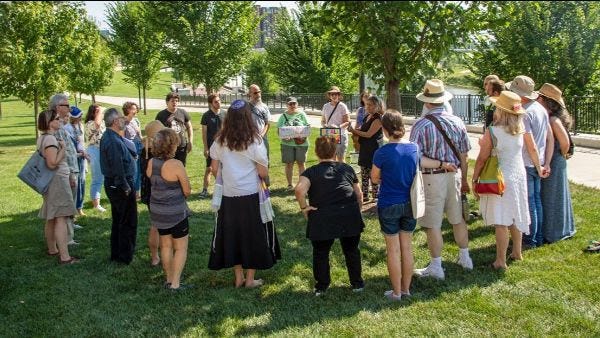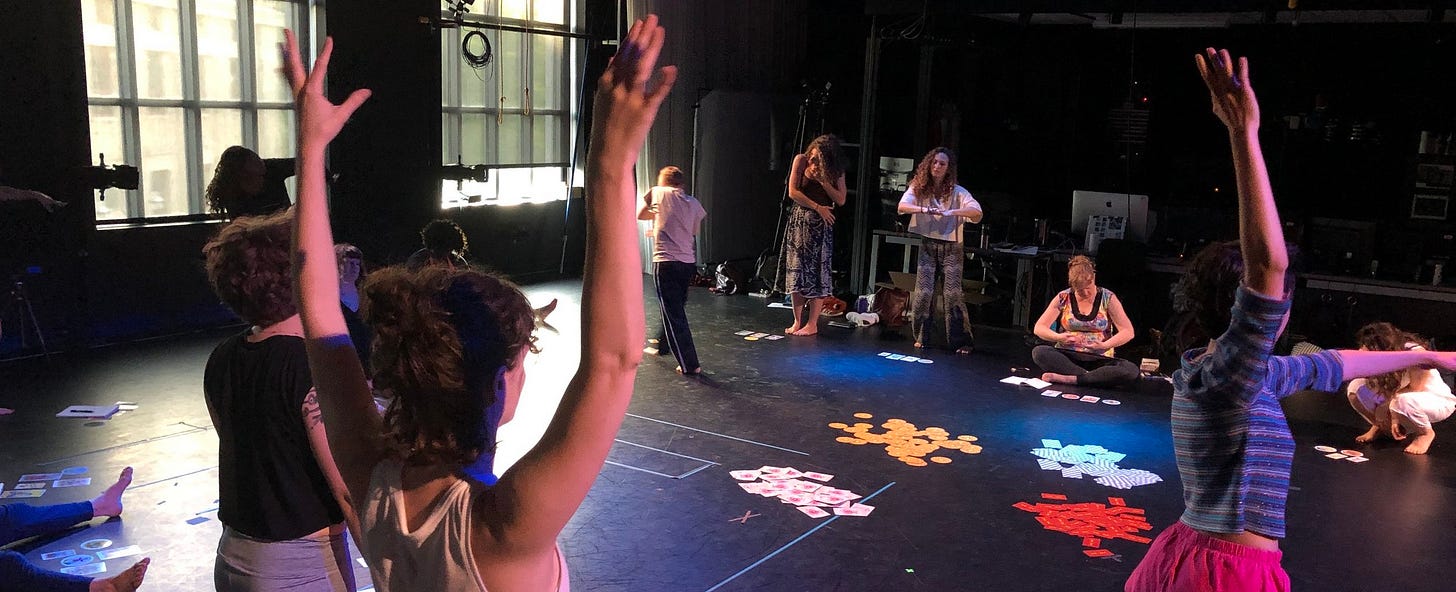Greetings Livable Futures friends!
Some of you may know that I live Jewishly. I was raised in a mix of 1970s hippy progressive spiritual practices in an interfaith family and as I came into my adulthood I found the greatest grounding in the Jewish calendar and spiritual practices and raised my family this way.
I’m not a theist and I am not committed to the monotheistic project. I love the Buddhism, Wicca, and various anti-racist, queer feminist values woven in to the particular communities of contemporary judaism with whom I connect. If you’re curious, check out the Judaism Unbound podcast for some fabulous examples of contemporary practices.

This week, we are in the middle of the Jewish high holidays in a period called the Days of Awe and I appreciate the support they offer my life. This is the season of turning and returning as we pass through the new year (Rosh Hashanah) and into Yom Kippur (this weekend) a season of reckoning and re-committing. I find this an important part of my daily work around anti-racist thought and action and I appreciate the annual opportunity to take stock as well.
This is not about traditional notions of atonement as much as reckoning with what is, and identifying where we can do better as individuals and also as a community. One of my favorite parts of the Yom Kippur services is when we collectively go through a long list of accountability statements where “we” failed to meet the mark—failed to live with the kind of integrity and generosity and peace that is our commitment. Whether or not the items on this list relate to something I personally did, I take responsibility with the whole community for those failures and I commit, with the community to do better in the year ahead. In this way, we collectively atone for the failures of the group and ours are also held by everyone.
You need not be Jewish to use the energies of the season to find your own practice of reflecting, accountability, returning, and re-committing. I’d like to bring this to other communities in which I practice and you can too if it speaks to you.
I am reflecting on this question:
How does taking collective responsibility support individual change?
Responsibility it another word that is hard for folks and I’ve been really appreciative of the work of Gay and Katie Hendricks in understanding both commitment and responsibility. Try this:
Take responsibility instead of burden. When you find the right energy, taking responsibility feels liberating and activates motivation and energy. Taking burden feels heavy and full of judgement and often sparks defensiveness.
Are there practices in your wisdom traditions or organizations that align with any of these processes? I’d love to hear about them.
Inspiration: Dori Midnight and Reverent Rituals

One of my favorite authors in this space is Dori Midnight and whether you are Jewish or not, you are likely to find richness in her offerings. Dori’s self description is in itself an invitation into your own wild and specific ways of being. She writes,
“for over 20 years, I have practiced intuitive healing and woven rituals in reverent collaboration with plants, the seen and unseen, and in service to personal and collective healing. My work is rooted in and guided by Jewish ancestral traditions, feminist, decolonial and abolitionist scholarship, queer liberation, and disability and healing justice work. I am interested in remembering ancestral healing ways and stories that have been lost, hidden, and co-opted in the maw of assimilation, trauma, capitalism, and re-enlivening them to cultivate more embodied presence and deeper connection to ourselves, each other, the earth. I believe that rooting into ancient Jewish wisdom from a radical, decolonial and abolitionist position can be a source of support as we work towards the world we dream of, built in interdependence, co-liberation, and love. I offer classes on reconnecting with Jewish ancestral traditions, Jewish plant and protection magic, and remedies and rituals for unraveling times.”
I came to Dori’s work through my former student Michael Morris who is also an incredible artist, scholar and worker of magic and a contributor to the Livable Futures project.
Listen to Michael on the Livable Futures podcast for some nourishment this week and consider leaving a rating to help the work reach more people (thank you!) or read from them on our Idea Archive.
Dori shares a few thoughts on her website about this time of year that I think our Livable Futures community will appreciate. She writes,
“perhaps the sacred work this year involves hearing the calls for reparations, the call to dismantle white supremacy, ableism, transphobia, classism, anti-Black racism in Jewish communities and beyond, the call to tend to our most vulnerable siblings, the call to invest in community care and mutual aid, the call to slow down, the call for indigenous land sovereignty and wise care of our earth.
One of my beloved teachers Joanna Macy calls this time of profound transformation and loss “The Great Turning,” and also names the shadow process, “The Great Unraveling.” As the monuments to white supremacy are being toppled and, may it be so, we continue to dissolve and burn and dismantle oppressive structures, we are also called to dismantle our own internal harmful patterns. We are also being unraveled. Who among us has not felt undone, disassembled, like we are falling apart?
Who among us has not been called in, called out, asked to do better, to know better, engaged in a repair process…This is the work we are instructed to do in Elul and in the ten Days of Awe…How can we work with the gifts of this season that they have imparted to us: tefilla (prayer), teshuvah (returning to ourselves), and tzedakah (reparations) for the sake of collective liberation and healing?”
The links alone in this offering are valuable guide posts into doing all manner of work and play for creating more livable futures. Dori’s language always make me feel a sense of hope and possibility, perhaps she will do the same for you.
As we say in our Livable Futures vision statement, she turns toward planetary conditions with all of her creative capacities.
Mantra for Today
The mantra that I find supportive in this work comes from Gabbie Bernstein
“I forgive myself for that fear based thought and I return to love.”
When I say this, I can feel myself release judgement and return to a state that is supportive of peace and right action. Gabby Berstein has some really nice work on forgiveness. She writes in her blog,
“The practice of forgiveness is a radical experience because it helps us not only undo the burden of that inflicted belief system or pain or suffering from the past, but it also releases us from a negative energetic attachment to the other person. When we let them go we let ourselves off the hook too. The same goes for forgiving yourself.”
https://gabbybernstein.com/podcast/forgiveness-successful-relationships/
I hope you find something you needed in these offerings today and as always, I welcome your comments and questions. It is a gift to be in community with you this way.
-Norah





